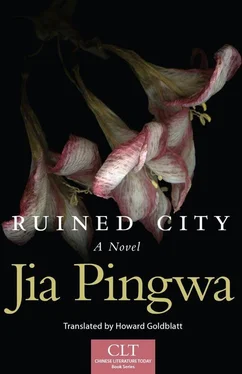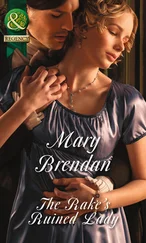Once inside the compound, they faced three courtyards, each of which fronted an entryway, a corridor, and a bedroom with eight patterned windows. But a motley collection of residents had carved up the yard, with a tent here, a little shack there, and buckets of filthy water and trash baskets blocking every door. With difficulty, Zhuang and Zhao negotiated their way through, encountering residents in their underwear cooking a meal or playing mahjong on rickety tables in doorways, all turning to gawk at the new arrivals. The rear courtyard was a jumble, including side rooms, their wood-framed windows propped open by bamboo poles. A curtain hung over the doorway, which lay in the shade of a Chinese toon tree.
“This is where I live,” Zhao said. It was dark inside, and it took some time before the pitted limestone-covered walls came into view. An old-fashioned mahogany table stood beneath the window, and behind it was a bed piled haphazardly with books and magazines. A thick layer of limestone covered the floor under the bed. Zhuang knew that was to protect against dampness. Zhao invited Zhuang to sit with him in two squat chairs, which Zhuang noted were exquisite. He heaved a sigh. “This is my first time inside one of these Xijing residential compounds,” he said. “People used to say how comfortable they were. Now that they’re home to so many families, I wonder what it was like to be the only residents in one.”
“We were the only residents, but poor people were allowed to move in in the fifties, and once they were here, you couldn’t get them out. The numbers mounted, all but destroying the place.”
“So this place was yours. You never told me your family was wealthy.”
“You won’t believe it, but they weren’t just wealthy. When the Eight-Power Allied Forces sacked Beijing at the end of the Qing dynasty, who do you think protected the Empress Dowager when she fled to Xijing? My grandfather. He was a famous Legalist scholar who served as the head of the Bureau of Punishments. The whole street was ours. When the allied armies attacked, he was one of the five pro-war leaders of the Qing court, a secret supporter of the Boxers. The allied armies were invincible, so the Empress Dowager fled west. The official Li Hongzhang stayed behind in Beijing to sign the Xinchou Unequal Treaty with the demonic Western powers, who demanded that the senior pro-war figures be severely punished, my grandfather included. They were to be hanged. The Empress Dowager was told to hand him over, but sixty thousand Xijing residents massed in front of the clock tower, saying that if she turned my grandfather over, she could no longer stay in Xijing. To appease the crowd, and to keep one of her ministers from falling into the hands of the Westerners, she allowed him to commit suicide. He swallowed gold, but when that didn’t do the trick, he allowed himself to be smothered to death. He was fifty. After that, women in the family began selling off property to survive, until only this compound was left. You can see for yourself, these two chairs were the only things passed down to me.”
“My!” Zhuang exclaimed. “Such a distinguished family history. Six months ago, the mayor organized a team to produce a book titled Five Thousand Years of Xijing History . I was responsible for the chapter on literature and the arts. After it was published, I read that the head of the Qing dynasty Bureau of Punishments had been a Xijing man, but I never dreamed he could be your ancestor. If the dynasty hadn’t fallen, your grandfather would have lived his life out, and I’d have had a devil of a time trying to see you.”
Zhao laughed. “And Xijing’s Four Young Knaves wouldn’t be the bastards we have now.”
Zhuang stood up. Through the bamboo door curtain he saw a woman in red sitting on the steps across the yard rocking her baby in a cradle and reading a book. “The world is changing all the time,” he said. “This is what a once-magnificent home has deteriorated into. Pretty soon even this will be gone. Tongguan is my ancestral home, and as one of the most strategic spots in the Central Plain, it has been the site of many glorious chapters in our history. But ten years ago, the county seat was moved, and the town became a wasteland. I went back not long ago and sat in one of the old buildings. I couldn’t stop sighing. When I came back, I wrote an essay about it; maybe you read it.”
“I did,” Zhao replied, “which is why I invited you here today. Maybe you can write about this sometime.”
The woman was now facing them, but did not look up. She was too caught up in her reading; only her long dark lashes and straight nose were visible. “She’s lovely,” Zhuang said.
“Who?” Zhao stuck his head out. “Oh, her. She’s a maid for the family across the way, from northern Shaanxi. That part of the province has nothing to brag about but its women.”
“I’ve been looking for a maid for a long time, but haven’t found the right one. I’m not impressed with those at the labor market. Think she could find me one back in her village?”
“This one’s articulate and mannered. If she worked for you, she’d treat your guests with courtesy. But people talk behind her back, saying that when her employers are away, she gives the baby a pill so it will sleep all morning. I don’t believe it. I think the other maids in the neighborhood are jealous over her appearance and the affluence of her employers.”
“Obviously a pack of lies. No girl would do something like that,” Zhuang said.
The men sat back down after Zhao shut the door and began taking antiques out of a wooden chest to show Zhuang: ancient scrolls with calligraphy and painting, ceramics, bronze implements, coins, stone rubbings, and carvings, but what attracted Zhuang were eleven ink stones. They were also Zhao’s most prized possessions. He had Duan stones, Zhao stones, Hui stones, and clear clay stones, all very old and all engraved with the users’ names. One by one, he handed them to Zhuang to point out the color and pattern, to let him feel the texture with his fingers and tap them to hear the sound. He then told him the names of all the owners, original as well as later, and the official positions they held, what calligraphy and paintings they left to posterity, and what brought them fame.
“How did you get these?” Zhuang asked with surprise and envy.
“Some I collected a long time ago, others I bartered for. I paid three thousand yuan for that one.”
“Three thousand? That’s a lot of money.”
“A lot of money? These days I wouldn’t take twenty thousand for it. A month or so ago I visited the Lianhu District Museum. The city built a large museum and asked people to donate their artifacts. The district museum wanted to sell their undocumented odds and ends to put more money in the hands of the staff. I fell in love with this stone, which they offered to sell me for ten thousand yuan. We went back and forth, and since I know them, in the end I got it for three.”
Somewhat doubtful, Zhuang picked up the stone to examine it closely. It was several times heavier than the other stones. He tested it with his teeth; it gave off a metallic ring when he held it up to his ear. He saw a line of characters on the bottom that read: “Wen Zhengming’s fancy,” the one-time property of the famous Ming painter.
“Jingwu,” Zhuang exclaimed, “you’re obviously an authority. If you forget me the next time you come across something like this, I’ll never do another thing for you.”
“Take it easy,” Zhao said. “Someone told me that Gong Jingyuan’s son, Gong Xiaoyi, an opium addict, has a fine ink stone he wants to sell as soon as his father goes abroad. I’ll go see for myself. If it’s the genuine article, I’ll get it for you. I told you I wanted to give you something. How about these?”
Читать дальше


![Matthew Vincent - [you] Ruined It for Everyone!](/books/216429/matthew-vincent-you-ruined-it-for-everyone-thumb.webp)









